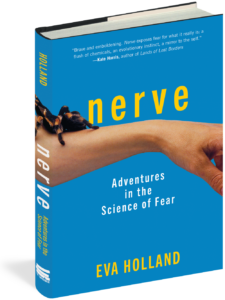 Fear is something we all face on a daily basis—whether it’s spotting that creepy-looking spider on the ceiling or stepping out of an airplane to skydive. For award-winning journalist Eva Holland, fear was one of the biggest questions in life—How do we feel fear, and why? Is fear necessary? Is it rooted in the body or the mind?—and so she set out to find answers.
Fear is something we all face on a daily basis—whether it’s spotting that creepy-looking spider on the ceiling or stepping out of an airplane to skydive. For award-winning journalist Eva Holland, fear was one of the biggest questions in life—How do we feel fear, and why? Is fear necessary? Is it rooted in the body or the mind?—and so she set out to find answers.
In Nerve: Adventures in the Science of Fear, Holland reveals what it’s like to live in the clutches of paralyzing dread. And with remarkable courage, she tests the limits of what one can do to live less fearfully—from engaging in daring adventure to cutting-edge research: She confronts her acrophobia by jumping out of an airplane, explores the lives of rare individuals who feel little or no fear, and meets with scientists working to eliminate phobias with a single pill.
Finding the nerve to face down her fears, Holland not only shows us how to grapple with our own, but invites us to embrace them as a way to live happier and feel more alive. Read on for an exclusive interview with Eva Holland on Nerve: Adventures in the Science of Fear, which publishes today!
Q: In the book, you detail multiple personal fears: your mother dying, fear of a heights, and fear of driving after several accidents. How did these fears lead you to further research this topic?
Eva Holland: Each of those three threads was a starting point for its own line of research. My fear of heights drove my research into the history of phobias and how we treat them. My mom’s death led me to do a lot of reading about grief and its aftermath, and to think in general about grief and loss. (A lot of my magazine work in the years since my mom died has also revolved around grief and loss—I think I’ve been working through this on a lot of fronts.) And then the car accidents were my first window into trauma and how it acts on our bodies, which was something I hadn’t really known anything about. One of the interesting things about working on the book was to pursue these separate strands and see how connected they are to one another. Grief, fear, anxiety, trauma—they’re all intricately linked.
Q: Knowing that activating fear of heights could be mostly avoided, what prompted you to want to tackle your acrophobia?
EH: The incentive for me was largely social: I could avoid the kind of heights exposure that triggered my fear, for sure, but that meant avoiding a lot of the activities and events that my friends here in the Yukon enjoy. So I wanted to get better in order to avoid being left out. FOMO trumped my fear of heights, I guess you could say?
Q: For someone who says they don’t find fear to be exciting, you have some fairly brave hobbies, such as rock climbing, and you live in the adventure-centric Yukon. Do you think your locale relates to your adventurousness?
EH: Definitely! I was not an outdoorsy or especially adventurous person before I moved here in 2009. But once I arrived here, I wanted to be able to spend time with my friends—and that meant learning how to be outdoors. It’s been a slow, sometimes hard, sometimes hilarious learning process since then, but I’ve come to genuinely love being in the wilderness and pushing myself physically and mentally while I’m out there. It’s a huge part of my life now. That said, I still feel like one of the most timid people I know here—I know it can seem strange to people elsewhere, that I see myself as fearful. But in the context of my community here, I think that particular self-perception makes more sense.
Q: How did you conduct your research?
EH: I started out by reading broadly: I read books about the science of emotions more generally— although, fortunately for me, these books often use fear in their examples, since it is the most studied emotion. I read a brain anatomy textbook to have a solid grounding before digging deeper into the neuroscience. Once I had a better sense of the big picture, I started digging into the scientific literature, looking for journal articles related to the specific topics I wanted to address in the chapters. And then, once I knew what research I wanted to highlight, I started reaching out to specific researchers to interview them directly. I tried not to focus in too tightly too soon, because I was concerned about overlooking something important. I still worry about that! But I was comforted when I started seeing repetition across different sources—multiple people referring to certain studies as milestones, that sort of thing. It made me feel like I was on firmer ground. I knew, since this was a hybrid of reportage and memoir, it was never going to be anything close to a comprehensive look at the science of fear. It was always going to be idiosyncratic. But I didn’t want to feel like I had left any gaping holes or unforgivable oversights.
Q: Much of your book is about the biology of fear. What was one of the most interesting things you learned from your research?
EH: I had been fairly ignorant about trauma—its power and its role in our lives—and learning more on that front kind of blew my mind. I try not to be too reductive, but it feels like this huge, mostly unspoken factor in our society—one that we’re really only beginning to understand. That was eye-opening.
Q: Historical treatments include lobotomies and electroshock therapy. Are current surgical therapies headed in a more positive direction?
EH: I’d say so, yes! We know more than we did then about how the brain works—about how people respond. No therapy is perfect—far from it—but there are more and better options than there used to be. And it’s worth noting that a modified version of electroshock therapy is actually back in use for certain patients with intractable symptoms of depression, for instance. But it looks quite different than the old horror show.
Q: What do you hope readers will gain from this book?
EH: Nerve’s not intended as any kind of manual or self-help book—I’m not endorsing my approach to others—this stuff is so personal. But if the book motivates people at all to try to find their own way through their fears, and if it offers them any kind of a starting point, that would be wonderful.
Q: How are you doing with your fear of heights? Do you find yourself practicing avoidance or approaching heights more calmly now?
EH: I’m still testing my new limits, figuring out what I can do and what still makes me uncomfortable. Last summer, after my initial zip-lining adventure, I went on a pretty challenging hike that included a very steep and exposed climb and descent over a mountain pass. I honestly expected to go over it on my hands and knees, sobbing, but while I was very cautious, maybe even nervous, that panicked feeling I expected never made an appearance. So that was exciting! I’ll be curious to see how my “cure” endures over time.
Q: Would you ever go skydiving again?
EH: . . . Maybe?
***
This interview can be reprinted in part or in its entirety with the following credit line: Interview with Eva Holland, author of Nerve: Adventures in the Science of Fear (The Experiment, April 2020) theexperimentpublishing.com



